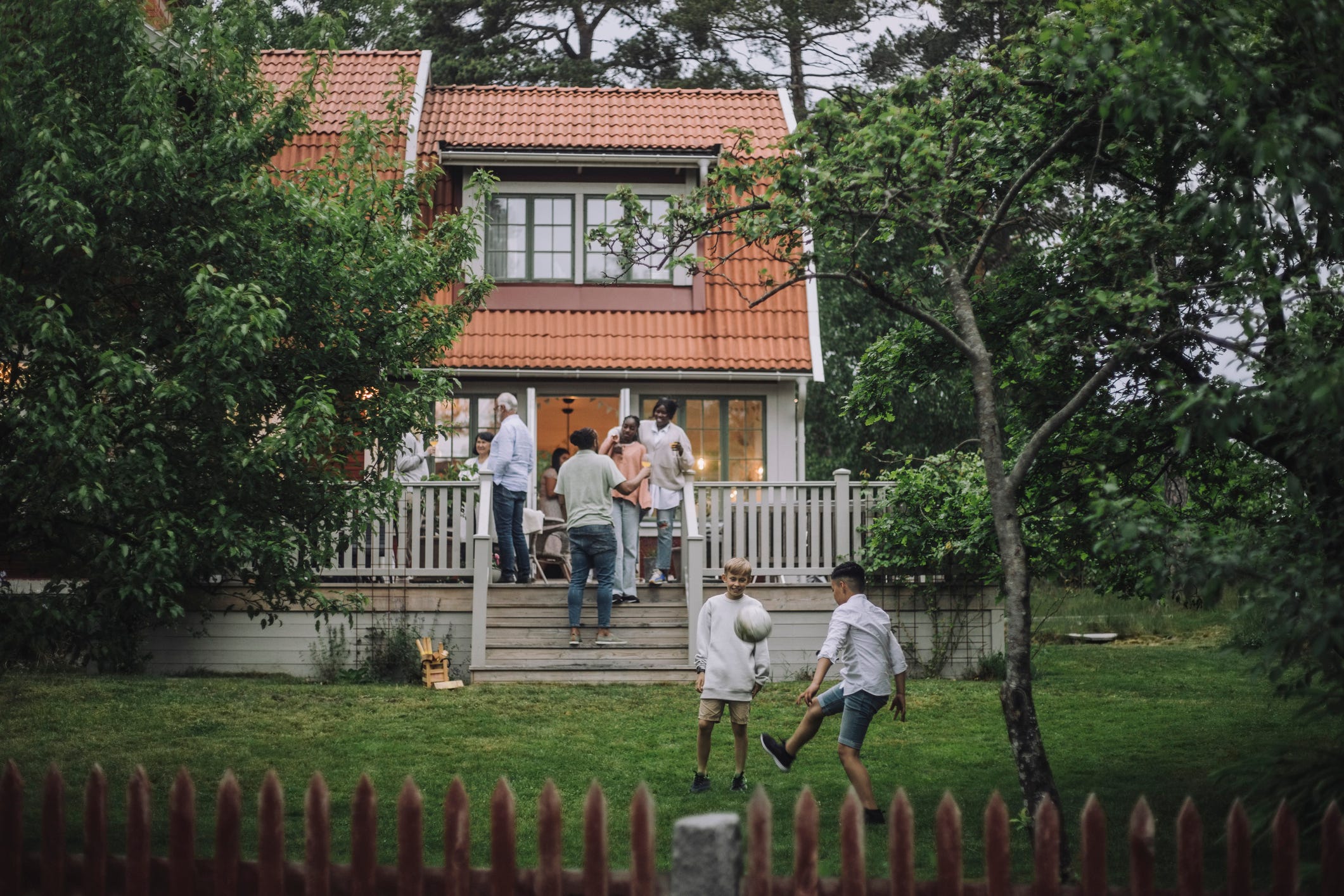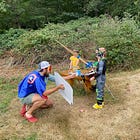My primary memories of childhood are of boredom, of reading, of Star Trek: The Next Generation, of endless hours at the pool — and of my parents hanging out. We did plenty of stuff as a family, but the weekends were always a mix of us going to other people’s houses or them coming to ours (or us at home with a babysitter while my parents went elsewhere). The most common scenario would involve all of the kids sequestered in one area (outside, the basement, a TV room) while the parents dominated another.
There were adults from church and adults who lived next door and adults from both of my parents’ workplaces. Some of them were the parents of my friends, but that was mostly happenstance. We went out on the river; we went camping; we babysat the young kids and made “spy notebooks” where we’d collect observations on what the parents were doing upstairs (mostly: grilling, drinking Coors Light, changing the cassette or CD).
Being in the homes of adults who weren’t family — and having a lot of people in ours — was part of the weekly and even daily rhythm of our lives. Some of that had to do with the fact that we’d moved to a small town in North Idaho thousands of miles away from my parent’s extended family, and some of it was my parents’ personalities, but some, too, was the era: there was no compulsion to spend the weekends taking us to, say, semi-elite basketball tournaments. Not that any of the kids in this group would’ve been the sort of kid to do that sort of thing, but who knows, in a different era, maybe. There was far less pressure to engage in bourgeois intensive parenting practices, which meant kids’ schedules rotated around their parents’ social calendars, not the other way around.
Which is all to say that as I grew up, I observed my parents cultivating networks of strong and loose social ties. I saw them in community. And even though the cultivation of that community was far more complicated and intermittently fraught than my childhood self could understand, it did normalize practices and rhythms and priorities that I reflect on regularly, both here in the newsletter and in my upcoming book, Friend Group.
A few months ago, I told you about some of the stories I’d begun collecting from people about how they’re consciously building community and friendship — through proximity, through saying yes, through consistency. Since then, I’ve done several dozen more interviews (we’re now over 65! and I still need to schedule so many more!) and something I started doing by accident has become ritual: I start every interview with the same question. Did your parents model friendship or community for you when you were growing up? Put differently, did your parents have friends?
I love how this question throws people. They’re so ready to come and talk about their own friendships — not their memories of their parents. I wish I could make a supercut of how many times the immediate response has been WOW, WHAT A GOOD QUESTION. And I don’t mean this as self-flattery, but it is a good question! And, I’ve found, a really great way to start an interview: you get to enter their life through the side door.
Now that I’ve heard 65+ answers to this question, here are some recurring themes:
The older the person I’m interviewing, the more likely they are to say their parents had close friends and community — because it was the ‘60s, or the ‘70s, and the social infrastructure that facilitated those connections was much more robust (and intensive parenting norms had yet to consolidate)
For people whose parents were married and had a lot of friends — most said that their mom was the social architect, while their dad was more of an introvert. Sometimes this is flipped, but I was interested in how often one parent (instead of both) was leading the charge.
The younger the person I interviewed, the more likely they’d answer along the lines of “I guess my parents were friends with some of my friends’ parents, but that sort of dwindled as we got older” (people in this camp were also likely to describe a statistically common “friendship dip” — their parents didn’t have many friends when they were kids, but they have friends now that they’re retired)
Divorce often functions as a pivot point — after the divorce, one parent often became more isolated (not necessarily the mom or the dad)
The further your parents live from their close family, the more likely they were to cultivate a close community (this seems obvious but is pretty crucial — you’re essentially forced to build a social safety network)
Dads were far more likely to have a close set of guy friends if the family was involved in a religious organization (I have my theories about this that I’ll expand in a future newsletter or, you know, the book itself)
If someone’s parents are queer, they are also more likely to have a broad network of community (this also makes sense, especially for the queer parents who were parenting in the ‘80s and ‘90s)
If someone is a second-generation immigrant (e.g., their parents immigrated as adults) they had one of two experiences: a very close network of other immigrants….or no friends at all
Growing up rural sometimes means having a stereotypical group of people who show up to, like, build the barn — but just as often, people’s parents decide to live rural because they don’t actually like hanging out with other people
If someone was raised by a single parent, they were much more likely to remember their parent having close friends who were around a lot
Most of the people I’ve interviewed who are deeply involved in their community — or in the lives of someone they’re not related to — had showing up, even when it’s not convenient modeled for them (and explicitly explained to them) throughout their childhoods. If you complained about having to go over to someone else’s house to drop something off, if you didn’t want to come to the dinner table because they’d invited someone you thought was weird, the messaging was explicit: this is what we do for other people.
Sometimes an interviewee would have tons of memories of their mom being involved — volunteering, doing stuff at church, delivering casseroles to people — but few memories of their mom having friends
When someone’s parents doesn’t have friends, it’s consistently a source of sadness for the (now adult) child — sometimes, the sadness is related to loneliness and isolation they themselves felt as kids, but it also extends to how they’re able to care for their parents (if they’re still living) in the present day
So what about you? Did your parents have friends? Do you have memories of them in community? What was explicitly and implicitly modeled for you when it came to being a part of other people’s lives? And if you have kids, or you’re a significant person in a kid’s life, what would they say about you? If you don’t like the answer, how would you like it to change? ●
If you’re not yet a paid subscriber and want to read or join in the conversation — and get all the other perks that comes with subscribing, including this week’s Things I Read and Loved and the knowledge that you’re paying for the stuff you find valuable — just click below:
Further Reading:







